BOISE, Idaho — This story originally appeared in the Idaho Press.
Idaho Gov. Brad Little has signed into law a property tax reduction for higher-valued houses to keep some, but not all, older, low-income Idaho residents in their homes.
The Republican governor last week signed the measure that increases the maximum value of a home that qualifies for the property tax reduction program, called the circuit breaker. Last year, the Legislature passed HB 389, booting otherwise qualified needy seniors off the program if their home values rose.
The Idaho Center for Fiscal Policy said that about 27,000 people in 2020 received the reduction. HB 389 last year limited qualifying homes to 125% of the median value of homes in that county, eliminating many current recipients from getting the reduction.
The law signed by Little adjusts the maximum value of qualifying residential homes to 150% of the median assessed value, or up to $300,000.
The reduction ranges from $250 to $1,500, depending on household income, which could go up to a maximum of about $32,000. The average reduction is about $800.
Backers of the legislation said older homeowners with limited incomes need the tax break or they’ll be forced from their homes due to soaring home values and rising property prices.
The Senate this year passed legislation to raise the limit to 200% of the median home value in a county, but the House insisted on its version at 150% or $300,000.
Sen. Regina Bayer, R-Meridian, sponsor of the Senate bill, also served as the floor sponsor of the House bill in the Senate late in the legislative session. Bayer said the state Tax Commission estimates that HB 389's changes would disqualify 1,758 needy circuit breaker recipients. That number would drop to 625 who'd be disqualified under the House bill, she said, "still too many, but we're doing the best we can today."
"This bill does not protect as many citizens as I would have liked to help," she told the Senate, “but as we are so close to the end of the session, I'll be glad to see this much done, and I hope you feel likewise."
The bill, HB 481, passed the Senate 35-0 on March 22; it had earlier passed the House, 48-16. The Senate version, SB 1241, also passed the Senate unanimously, but died without a hearing in the House Revenue and Taxation Committee.
Watch more 'Growing Idaho':
See the latest growth and development news in our YouTube playlist:



